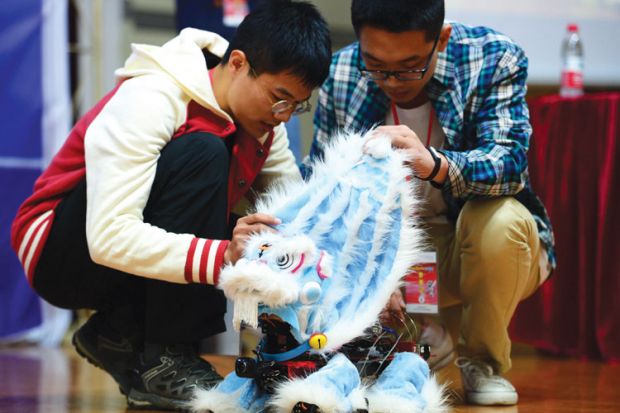View the full list of the world's top 100 universities for engineering and technology
Asia has continued its progress in this year’s Times Higher Education ranking for engineering and technology subjects as the dominance of the US and Europe wanes.
Asian institutions now make up more than a quarter of the list, claiming 26 spots among the world top 100, up from 19 last year. Overall, eight Asian countries feature in the table, including India, which makes its debut courtesy of the Indian Institute of Science, at 99th place.
All nations in the region have either held a steady performance or improved in terms of the number of universities featured since last year. China has doubled its representatives from three to six, while both Taiwan and South Korea have gained another, with two and five universities in the table, respectively.
The National University of Singapore is the highest-ranked Asian institution, at 13th place, and Hong Kong University of Science and Technology (HKUST) is just three places behind, in 16th.
As one reason for its success, Tongxi Yu, the institution’s acting dean of engineering, cited Hong Kong’s switch in 2012 to four-year undergraduate degrees, which allowed for the creation of a curriculum that is “student-centric, broad-based, interdisciplinary and holistic in nature”. He also referred to the university’s establishment of a Center for Engineering Education Innovation, which “fosters innovative learning”.
Although the US remains the rankings superpower, it has lost ground, dropping from 34 representatives last year to 31.
Four of the 11 European countries in the table – the UK, France, the Netherlands and Sweden – have also slipped. At the same time, Turkey and Finland – each of which featured a representative in last year’s table, in 99th and 100th place, respectively – have fallen out of the table. Germany is the only European nation to have gained a representative in the list, boasting seven institutions in the table, up from six.
This shift in the balance of power towards Asia reflects the success of reforms that have been adopted across the region in the past two decades, said Alessia Lefébure, director of the Alliance programme (an academic joint venture between Columbia University, École Polytechnique, Sciences Po and Panthéon-Sorbonne University – Paris 1) and co-editor of the book Asia: The Next Higher Education Superpower? (recently published by the Institute of International Education and the American Institute for Foreign Study).
“The best performers are found in countries where motivated universities are nurtured by national and local governments that concentrate funding on the high potentials, push for innovation, and facilitate the transfer of knowledge from foreign partners,” she said. “China has used this formula successfully since the late 1990s, but Singapore, Korea, Hong Kong and Taiwan have similar policies.”
She added: “Today most Asian countries are funding the training of thousands of PhD [students], especially in sciences and engineering. This is going to have a strong impact on Asian industries and economies in the next 30 years.”
The THE subject rankings use the same 13 performance indicators as the flagship World University Rankings but are recalibrated with different weightings to suit each field.
View the full methodology, along with the top 100 universities for engineering and technology
World's top 10 universities for engineering and technology, 2015-2016
| 2015-16 rank | Institution | Country |
| 1 | Stanford University | United States |
| 2 | California Institute of Technology (Caltech) | United States |
| 3 | Massachusetts Institute of Technology (MIT) | United States |
| 4 | University of Cambridge | United Kingdom |
| 5 | University of California, Berkeley | United States |
| 6 | University of Oxford | United Kingdom |
| 7 | Princeton University | United States |
| 8 | ETH Zurich – Swiss Federal Institute of Technology Zurich | Switzerland |
| 9 | Imperial College London | United Kingdom |
| 10 | Carnegie Mellon University | United States |
POSTSCRIPT:
Print headline: Asian reforms pay off in table positions
Register to continue
Why register?
- Registration is free and only takes a moment
- Once registered, you can read 3 articles a month
- Sign up for our newsletter
Subscribe
Or subscribe for unlimited access to:
- Unlimited access to news, views, insights & reviews
- Digital editions
- Digital access to THE’s university and college rankings analysis
Already registered or a current subscriber? Login










